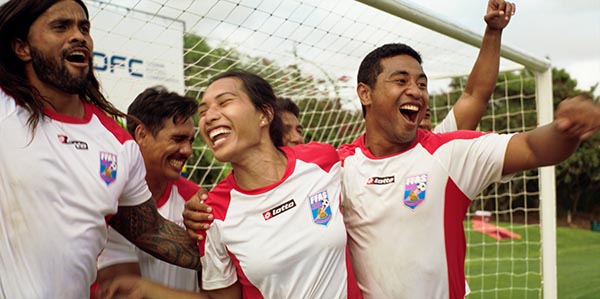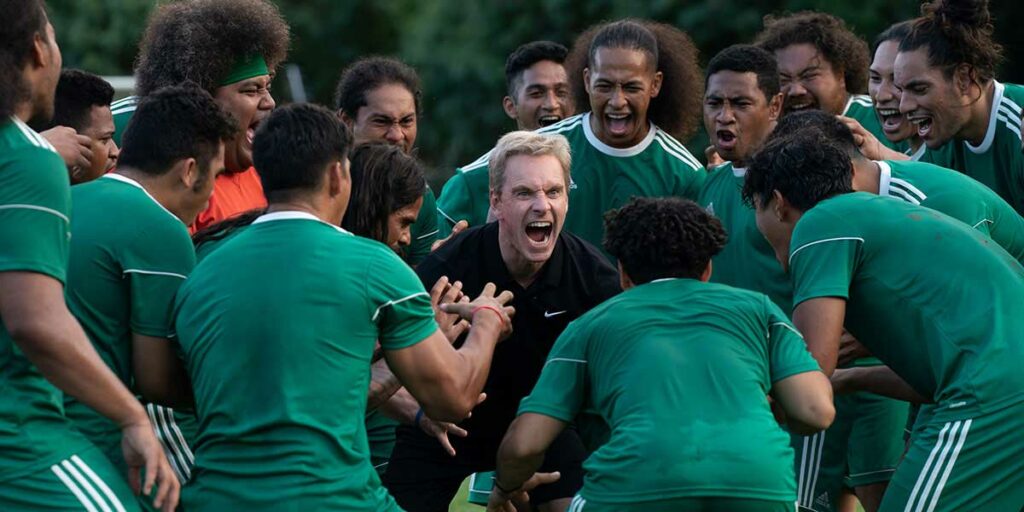Taika Waititi’s Next Goal Wins scores with its laughs but misfires on its story, leaving a flawed but fun final product.
Ever since winning his Best Adapted Screenplay Oscar for Jojo Rabbit, Taika Waititi has been devoted to amplifying indigenous voices worldwide. His own films now also seek to tell stories of Pacific-Islanders and situations specific to them. His latest offering is Next Goal Wins, inspired by the 2014 documentary of the same name, about the team from American Samoa in their 2014 World Cup Qualifying campaign. The team was so bad, they had never even scored a goal in international play. This made for the perfect hapless underdog story near ubiquitous in sports movies. Taika Waititi brought his charm to the already absurd tale, and results are mixed. Next Goal Wins clicks as a comedy, not so much as a sports movie.
Dutch-American Thomas Rongen (Michael Fassbender) is dismissed from his job as Team USA coach at the start of the film. As part of an arrangement conducted by team head Alex Magnussen (Will Arnett), Rongen accepts the head coaching position in American Samoa. The team’s 31-0 loss to Australia in 2001 is a record in international soccer that still stands today. Rongen’s job is to score just one goal and make the team less of a laughingstock. He has his work cut out for him as the team chemistry and play style is not to his level at all.
The story needed to make some changes to avoid feeling redundant to the documentary. Waititi’s flair for the comedic and the zany hijinks and pratfalls are played up in this movie. Rongen has a fiery temper, and his tantrums are played up for comedy. His strict, orthodox coaching style allows for comedic juxtaposition with the incompetent Samoan squad. Next Goal Wins can now become the story of a curmudgeon learning to lighten up a little and have fun with the game. In his story, he learns to accept fate and balance his life. The way Fassbender portrays Coach Rongen is consistent with this theme and the best part of the movie.
While the comedy is acceptable, the dramatic scenes feel fake. Rongen’s family trauma and the subplot involving his wife Gail (Elisabeth Moss) seem inappropriate for a movie involving fixing the worst team in the world. Rongen’s demons are not as important as him managing his own pride and balancing the team with his ego. The messages from his family on the phone feel like they belong in a different movie. None of this feels appropriate to Rongen’s arc, and this script may have been stronger had it stuck with Rongen’s straight-laced coaching style being adapted to fit a new team.

The team itself is not characterized in detail, except for Jaiyah (Kaimana) and possibly Daru (Beulah Koale). Perhaps twenty-two characters is a large number to develop, but they needed at least to give the players some sense of character. Even a one sentence descriptor like “the funny one” or “the happy one” would have sufficed.
Jaiyah Saelua’s character in particular required a great deal of tact to pull off right. Jaiyah is fa’afafine, an accepted third gender within Samoan culture (the closest cultural analogue for American audiences is a male-to-female transgender person). Jaiyah in real life was the first such person to play in a World Cup qualifying tournament. Aside from a scene involving deadnaming from Coach Rongen, not much controversy is raised and her portrayal is respectful, treated as a casual reality in Samoan culture. The debate of transgender athletes in sports has no easy answers, but it is not the place of this film to provide them. Jaiyah is a good player, and this is all that needs to be said.
Not much time is spent playing actual soccer. All the training and practice is meant to take center focus. The only game seen is the qualifier match against Tonga in the climax, and even that is condensed for contrived reasons. While the matches are not the main focus of the film, at least one more scene of gameplay would have shown the baseline for American Samoa as a team. Real-life footage of the game against Australia is used as the prologue, but it was over a decade before the start of the film. The movie glosses over how the team is “just as bad” in the current time, which may feel disappointing for the viewers who showed up for the soccer bits. However, the soccer bit is impressive and the moments watching the team come together to play feel cathartic.
Overall, Next Goal Wins is disappointing but with some strong points. Where it succeeds in comedy, it falls apart with its cohesion, feeling more like a sitcom rather than an earnest account of these characters. If more time were spent seeing these people playing or analyzing individual strengths and weaknesses, this may have been a stronger movie. As it stands, Next Goal Wins is just a brief synopsis of what happened rather than getting into the meat of what it represents for these people. It is worth watching on its own, but is not a suitable substitute for the documentary.
Next Goal Wins premiered at TIFF on September 10, 2023, and will be released in US theaters on November 17 and in UK cinemas on December 29.

